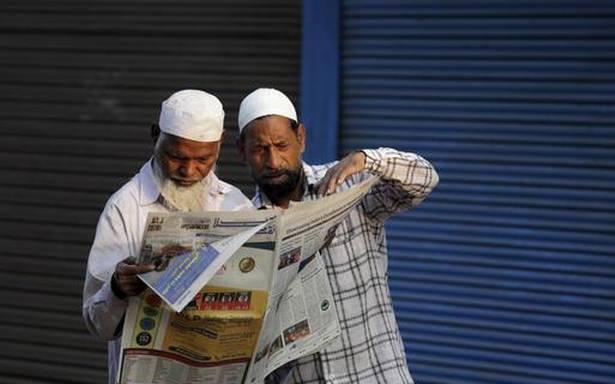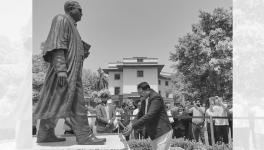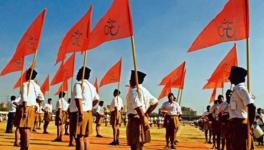Possibilities of Indian Muslim Political Discourse Beyond Prison of Grief

Image Courtesy: AP
The recent unprecedented anti-Muslim attacks across India carried out by the state-backed Hindutva foot soldiers have driven every sane individual, particularly the Indian Muslim community, to the extremities of anguish and despondency.
According to a recent survey, the community is experiencing an unparalleled spike in mental health concerns due to its increasing 'otherisation'. With each passing day, Indian Muslims are becoming increasingly disconnected from their surroundings, disengaged from themselves, and disturbed by the daily horrors of their life. Yet, they are unable to fathom how to save themselves from the carnage in the long term.
At this juncture, it wouldn't be an exaggerated claim that the continuous anti-Muslim onslaught has begun to realise one of the major purposes of the 'Muslim Solution' that this regime has on its list, which is, most importantly, incapacitating the will of a whole community, not just in psychiatric terms but also in political terms. In this context, the community's natural resistance, at best, is likely to adopt the language of grief and isolation.
Consciously breaking away from this paralysed state becomes the very first step toward contributing to or establishing any sort of political resistance.
The ‘Indifferent’ Being, the ‘Other’ and the Reproduction of Grief
During the years of Italian Fascism, Alberto Moravia wrote about an existential malady of ‘Indifference’ growing over Italian society at a time when the formation of new bodies and enemies constituted the basis of the country's culture.
The Moravian 'Indifference' differs from the conventional understanding of the word in the ontological sense that the Moravian 'Indifferent' being is not only 'Indifferent' to others, but also to 'itself,' without any knowledge of the cure. This type of alienation, brought on by a steadily dehumanising society, eventually forces the being to isolate, both from itself and from a universalist sense of the pain of other oppressed potential allies.
To understand how this ‘indifferent’ being is created in today's India under Narendra Modi's rule, one needs to open social media platforms where this state-backed onslaught has turned the mourning into a culture of "aestheticisation" of oppression. There, the virtual echo chambers only entertain the same shared reality, validate the constant reproduction of grief, and produce a monoculture that responds to talk of alliance building and universalism of oppression with an aggressive logic of its own suffering in exclusion. This is where the logic of politics devolves into the logic of grief, where the logic of resistance devolves into a virtual romanticism of oppression, and where the language of struggle merely reciprocates the oppressor’s logic of ‘Us/them’.
Assata Shakur, a noted black civil rights activist, states in her autobiography that the oppressed must continuously remind themselves of their oppression, but only to break free from it, not to submit to the oppressors’ forced pessimism, which dilutes the scope of any collective concrete politics of resistance.
These well-planned attacks against Indian Muslims aim to destroy their already devastated economic base and political scope (as stated above). These also aim to deconstruct their historically multifaceted identity into a reductive religious-communal identity in the way RSS has always envisioned and characterised the Muslims of India. The constant Hindutva propaganda has constructed the 'them' in the psyche of the majority community through fear psychosis and constant reproduction of this ideology in civil society. Thus, this simplified Identity of the Indian Muslim community paves the way for the 'becoming' of the 'other' in a material sense and justifies the existence of the Hindutva political narrative. To not actively resist the politics around this imposed essentialised identity is to deny the prospect of liberation from the Hindutva agenda and its static ‘definition’ of complex identities.
Politics of Alliance over Politics of Grief
First and foremost, the urgency necessitates a change in response to the current situation rather than knee-jerk reactions and paraphrasing what has already been stated a thousand times across social media platforms. Such a response has lost its significance in face of the insouciance that supports this onslaught. Concerned and capable friends must now move beyond the virtual reproduction of grief that has been inflicted upon us, and must, above all, break away from the logic of 'Us' and 'Them.' The direness of the situation now demands the extension of sustained political efforts and forging of alliances with other persecuted communities and with even those with whom agreements stand on the bare minimum, not just in the sense of partisan politics, but also in the nonpartisan terms, where coalitions based on a common minimum programme must be developed in civil society - in vicinities, in localities, in villages and in towns.
The current wave of anti-Muslim violence did not emerge out of nowhere; it is manifesting at the intersection of various socio-political and economic determinants. Although violence against Muslims is an end in itself, it nevertheless serves an instrumental purpose for the regime in obscuring other social, political and economic questions it does not want to address.
Another factor, and perhaps the most important one that led to the current state of affairs, is the tenacity with which the RSS has worked in civil society since its inception. It transformed complex identities of other marginalised communities into a simplified uniform identity of "virile" Muslim-hating "Hindu", which the Sangh has fabricated.
Similarly, the resistance against it will not come to a head overnight, and not without understanding the minority question in interconnection with other social and political-economic issues operating in a single totality. The resistance will not come without opposing this Hindutva logic of defining and transforming multifaceted identities. But above all, it requires conscious tearing down of the 'Indifferent' entity and breaking free from the prison of grief in which the current regime wishes to keep Indian Muslims forever.
Scopes for alliances and progressive politics exist and will always be possible. The impact of the Shaheen Bagh movement and the support it garnered from other marginalised groups and across religious divisions were felt across the country. Furthermore, the recent triumph of the farmers’ movement has demonstrated that no tyrant regime stands invincible. The inevitability and kindling of these movements, however, was premised on the formation of organised and unified political devices in the civil society, no matter how big or small. These movements were not the answers to the question, "Why is this happening to us?" but rather, "What is to be done?"
On "Hope"
One can argue that these times have made it easy for us to yield to the dark billows of melancholy, and I would agree that, yes, pessimism was never easier than today for all of us, but never was there a time when it was more obligatory to seek the paths upon which socio-political advancement depends; never was there a time when working on the application of the intellect for the construction of cohesive progressive political units was more necessary.
This 'rational desire,' as Terry Eagleton defines hope, stems from the experience of working on an independent cultural-educational project among the working masses across religious groups in one of the Sangh's new laboratories in semi-rural India. This ongoing small effort has demonstrated that a historically shared socio-cultural bridge between the have-nots of the two communities can be repaired even in the face of RSS’s constant communal propaganda, and the unarticulated dissatisfaction growing in the backdrop of the post-lockdown destruction of the unorganised economic sector can be given a language.
Regardless of how small or big changes have been accomplished as a result of this project over the last two years, the process itself has provided a better picture of the ground reality and the opportunity to develop a new resistance lexicon.
One could say it is illogical to hope for the impossible, and I would agree. Yes, it is not rational to hope for the impossible, but is it irrational to make the impossible a little less impossible? The question must be answered by fellow friends who have recently surrendered to this crisis of "hope".
The current situation requires us to transcend the trite dichotomy of pessimism and optimism, as Gramsci puts in a letter to his brother from prison during the years of fascism in Italy. A synthesis of these impulses must now manifest in organised political activity with perseverance, where "pessimism of the intellect" is checked by "optimism of the will" and vice versa.
As a need of the hour, the 'rational desire' begins to take form only when politics is applied, where it is more required, when it begins to recognise the universalism of oppression across persecuted communities. It starts with the acknowledgement of collective human agency as one of the active variables of social change and a determining factor in shaping the contingencies of human history; it does so against the teleological and fatalist version of historical progress, which underpins most of today’s "popular" yet ‘Indifferent’ political narratives in the name of resistance.
Two Muslim juvenile boys from Bareilly were recently arrested for listening to a Pakistani song. So, at the risk of being charged with obstructing national integration, let me write these lines by one of my favourite Pakistani poets to aggrieved friends and everyone fighting for a brave new world in the face of this hindutva dystopia; Iftekhar Aarif writes:
Ye sab kath putliyan raqsan rahengi raat ki raat
(All these puppets would keep on dancing until the night)
Sahar se pehle pehle sab tamasha khatm hoga
(With the breaking of the dawn, this circus will cease to exist)
Dil-e-naa mutmain aisa bhi kya maayoos rehna
(Dear restless heart, why remain without hope?)
Jo khalq utthi to sab kartab tamasha khatm hoga
(The day masses will rise, all tricks and show will conclude).
(Shadman Ali Khan is an independent researcher and a student of political economy, philosophy, and geopolitics. He is currently engaged in a number of research and political projects in east India's rural regions. Views expressed are personal)
Get the latest reports & analysis with people's perspective on Protests, movements & deep analytical videos, discussions of the current affairs in your Telegram app. Subscribe to NewsClick's Telegram channel & get Real-Time updates on stories, as they get published on our website.
























